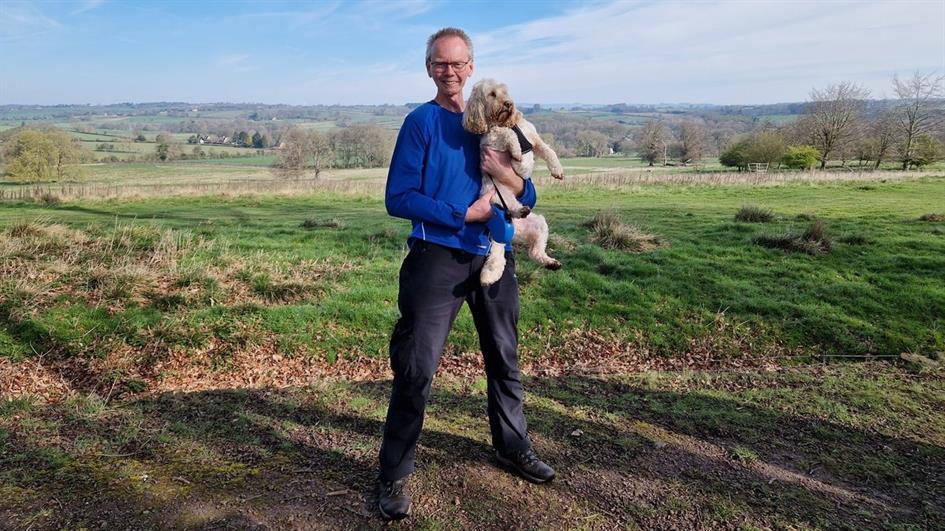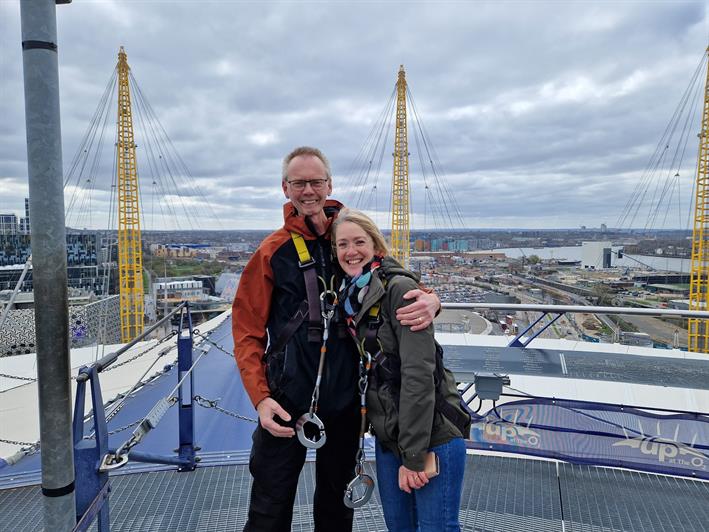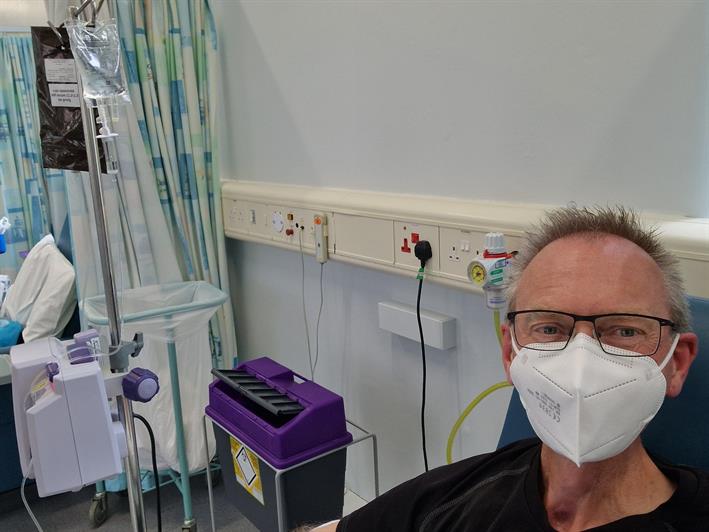
Image: John with his dog. Credit: John Dabell
The first red flag telling me something was wrong was when my tongue started to swell. I soldiered on because I didn’t think there was anything sinister going on. That was a mistake.
I started having difficulty eating and swallowing, but I put that down to my throat being sore. I was also extremely tired, but I had a young daughter at home and was busy being a primary school teacher.
After about a month, things hadn’t improved. I found that I couldn’t utter my words in the same way and things started to get painful. Then my tongue inflated, and I went to see my GP, who recommended I see my dentist. My dentist immediately referred me to a head and neck specialist at the Queen’s Medical Centre in Nottingham.
With your ongoing support, we can help give more people with cancer the hope of a cure with immunotherapy.
My life changed forever
A biopsy and MRI scan revealed that I had a tumour growing inside my tongue and it was stage four head and neck cancer. This knocked me for six, but what came next changed my life forever.
The preferred protocol at the time for treating head and neck cancers was surgery, chemotherapy, and radiotherapy. For me, this meant 15 hours of surgery, 35 doses of radiotherapy and six weeks of chemotherapy. To give me the best possible chance of living, most of my tongue had to be removed.
While the treatments were effective, the impact on my body was severe; I was fed by a tube in my stomach for many months afterwards and I had a tracheostomy to help me breathe. My jaw was subjected to enormous injury, and I’ve suffered from jaw infections and severe bone damage ever since, including lower mandibular bone death or osteoradionecrosis as it is known.
I’d been teaching for nearly 20 years. One day I was at school and the next day I wasn’t. I never returned to teaching again because having such radical surgery meant losing my ability to speak and articulate in the way I’d done before. My career was over.
A second cancer diagnosis
Within a year of treatment, I was back on my feet and had a new job. But then, 11 years later I started to notice that after exerting myself, my breathing didn’t feel quite right. I had white patches and nodules at the back of my throat and even more difficulties swallowing.
My head and neck surgeon decided to have an exploratory look using a camera. I went in as a day-case for what was supposed to be a quick 30-minute check while under anaesthetic. When I came round, I realised something was wrong because I had a tracheostomy fitted to help me breathe.
My surgeon told me they’d found a tumour lodged in my throat the size of a golf ball, called hypopharyngeal carcinoma - another stage four head and neck cancer. I was told that I wouldn’t have long to live.
My will to live was unflinching
Surgery was suggested, but there was no guarantee it would work. My thinking and mindset were in utter turmoil, so my wife stepped in as my advocate. She’d been reading about a new treatment - immunotherapy. But the surgeon dismissed this and said it wouldn’t work for me.
We asked to see my oncologist, who thought immunotherapy was an option, but a pathway had to be followed which meant chemotherapy first. There was a flicker of hope and my will to live was unflinching and unwavering. I simply had to be here – this was not my time.
I had chemotherapy right at the start of the coronavirus pandemic. This initially worked but it was stopped because of lockdown. The cancer started to spread. My oncologist then decided to give me a 6-week high dosage radiotherapy regime and to start me on a monthly cycle of immunotherapy and a drug called nivolumab.
The radiotherapy in conjunction with immunotherapy made all the difference. The high dose radiation targeted the tumour and prepared the way for my immunotherapy.

Image: John with his wife after climbing the O2 in London. Credit: John Dabell
I started to feel optimistic about my future
Understandably, many people dislike and even detest the battleground terminology associated with cancer. But in the case of immunotherapy, your body literally starts fighting back – and mine certainly did!
I expected all sorts of side-effects with immunotherapy and waited for the storm to arrive, but nothing came. I then started to doubt whether it was working, as I’d had horrendous side-effects with chemotherapy and radiotherapy.
Little by little, I started to feel remarkably different and more optimistic about my future. I’d already outlasted the two months predicted by one of the surgeons and I thought I might live perhaps another year.
I didn’t know if it was going to work
Three years later and after 40 infusions of immunotherapy, I’m here to champion it as a treatment that can work - look at me! I’m very aware that it doesn’t work for everyone, so I’m sensitive to other people’s experiences, but nivolumab has been particularly effective for head and neck cancers.
The thing to keep in mind is that there are different immunotherapies and sometimes it’s a question of finding one that works best for you. We are all very different which is why targeted therapies are so important.
I’m what has been referred to as a ‘super responder’ and I go from strength to strength. At the time I didn’t know if it was going to work at all. I certainly didn’t imagine I’d be three years down the line, hiking the dales a day after treatment.
Immunotherapy is keeping me alive
Nivolumab is working wonders for me. I can have my treatment and just carry on as normal. Each month, I visit the hospital and have a 1–2-hour infusion. I call it my ‘spa treatment’ because I know it is doing me good. In stark contrast to my experiences undergoing surgery, chemotherapy and radiotherapy, there is no nausea, pain or other debilitating side-effects.
Immunotherapy is keeping me alive. It’s prolonging my life and dare I say it, it’s making me think that it could even cure me. My CT scans have shown that there is no evidence of disease, and that is wonderful. Immunotherapy is still very new, but it is becoming more widely known. Immunotherapy isn’t the future though – it’s here now and it’s saving lives.
One of the reasons why I think it’s working so well for me is because I put in a lot of effort into keeping fit and eating well. I walk around 5 miles a day, including on treatment day. No one has told me to walk miles every day, but I make it my mission to get out and get moving to enhance my survivorship.

Image: John at his 38th immunotherapy session. Credit: John Dabell
I’m full of confidence and optimism
I still live day by day because I know that life is fragile and things can turn on a sixpence - but this time feels different. I’m now fighting with hope, confidence and optimism. Although I have lots of issues with my eating, swallowing and speaking mainly as a result of my surgery, I can put up with that because I am still here and enjoying life with my wife and daughter.
Being a cancer patient means you've got to be full of courage to get through the day. Displaying determination and resolve in the face of overwhelming odds is what we do.
I’ve learnt to co-exist with uncertainty and to cope effectively with anxiety, including the fear of death. When you have incurable cancer, it takes incredible, near unfathomable self-motivation to keep getting up each day and keep living your life positively.
We must keep hoping
I read up about immunotherapy, including the work of the Nobel Prize winners, James Allison and Tasuku Honjo. Their remarkable T cell discoveries have led to game-changing treatment by stimulating the ability of our immune system to attack tumour cells.
Cancer is complex, but scientists like those at The Institute of Cancer Research, are unravelling its complexity and their discoveries are leading to new cancer treatments, and ultimately saving more lives. We are getting there, and revolutionary immunotherapies are helping more people than ever, survive cancer. That's why we must keep hoping.
The cosmic coin toss can appear cruel when it lands cancer-side up, but that’s not the time to accept your fate. We flip again and again. Now the coin has landed on the side of immunotherapy and that gives me hope. And there is no medicine like hope. Take at regular intervals and don't stop!
Help give more cancer patients the hope of a cure with immunotherapy. Our research plans are ambitious and need ongoing support. Please make a monthly donation to help patients live longer and to save many more lives.